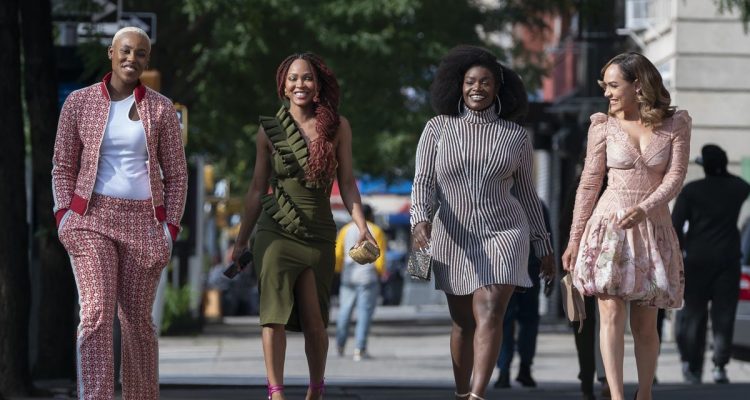Streamers and studios are having a creative crisis in the current TV landscape. We’ve stumbled into the era of reboots, for better or worse, as well as video game adaptations and spin-off series of popularized characters. But there continues to be an unquestionable loyalty to romantic comedies that offers a respite from the ever-present cop series and moody dramas. So often, the most appealing shows are the instantly relatable ones, and Amazon Prime’s Harlem, returning for its sophomore season, proves that some formulae are worth replicating.
The series, created by Girl’s Trip scribe Tracy Oliver, follows a quartet of tight-knit Black women searching for stability and happiness in dating, work, and their changing city. At first glance, it can be easy to reduce these women to which Sex and the City character they’re most like, but that would defeat the purpose of the show. Instead, these are individually outstanding Black women flowing through Harlem together with plenty of mistakes made along the way.
At the show’s center is Camille, played by Meagan Good, a professor at Columbia University vying for the tenure track. We also have fashion designer and hopelessly infatuated Quinn (Grace Byers), the vivacious but yet-to-strike-gold singer/actor Angie (Shoniqua Shandai), and out-and-proud dating app creator Tye (Jerrie Johnson). Like Carrie Bradshaw’s newspaper column, Camille’s lectures narrate the episode’s theme as each friend contends with obstacles that correlate to class.
Season two opens from where the first season concluded: After resigning from Columbia University, Camille is deciding how to move forward with her ex Ian (Tyler Lesley) after the two shared a kiss the night before his wedding. Additionally, Tye is being blasted on SheBToxic.com by previous lovers, Quinn is contending with her contentious relationship with her mother while exploring her bisexuality, and Angie continues toward stardom through the highs and lows of creative pursuit. The predominant theme of this season is Black joy, and while it reverberates throughout the season, there are some crushing lows.
After the reappearance of her (ex)husband Brandon (Kadeem Ali Harris), Tye is looking toward her future with a companion but is struggling to find a manageable solution to her illness, particularly with a doctor that is not interested in explaining her options. Looking for a deeper connection, she meets a florist (Rachel True), who consistently challenges Tye’s often trivial anguishes, particularly when it comes to the life cycle of a plant.
Meanwhile, Quinn quickly realizes that her sexuality doesn’t reflect who she is dating, leading her to question what she wants out of a partner. Then, toward the middle of the season, she experiences a mental health crisis that propels her into a self-reflective journey, exemplified in episode five as she attends a pride parade in an array of rainbows. Lurking underneath her colorful exterior is a woman struggling with identity and self-worth.
Angie, played with an insatiable buoyancy by Shoniqua Shandaiz, is moving forward from her stint in Get Out the Musical but still lives on Quinn’s couch. However, after securing a role in a Hallmark (white) Christmas movie, Angie is forced to confront the reality of working on a project where her character is named Ebony Jackson Washington, and the hair department doesn’t know how to style black hair.
Finally, we have Camille, who is self-aware enough to acknowledge that her overthinking continually lands her in hot water. Following her embarrassing drunken announcement on Dr. Pruitt’s (Whoopi Goldberg) front steps, Camille struggles to be open with Ian as Jameson (Sullivan Jones) re-enters her life with an opportunity she won’t be able to pass.
All this is to say is that things are happening in Harlem, and there are no easy answers. The ability to use their voices is true between the four friends. Tye needs to talk to her (ex)husband desperately, Quinn wants to stand up to her mother, Angie is uncertain if romantic love is for her, and Camille detaches too readily from difficult conversations. These are 30-somethings in New York living openly amongst the mess.
But in a season revolving around the theme of Black joy, Oliver ensures that we see their goofy sides. The touchstones of these friendships give the series warmth, like when the women take a girl’s trip in episode seven, and each friend contends with the kind of vacation they need at that time. Tye may be trying to recapture her younger days, but Camille is proving why her lectures have a waitlist, and Angie is finding her insatiable sexual appetite diminishing for one man. They support each other’s journey no matter the pitfalls, embarrassments, or disagreements.
Harlem Season Two also cements the main cast as actors to watch. Meagan Good is already starring in Shazam (though she fairs far better in Harlem), and it’s only a matter of time before Byers, Shandai, and Johnson land their next big move. These stars are on the rise, and we’ll see more of these names soon.
Reposted from wanderingscreen.com


